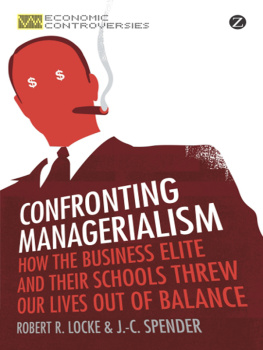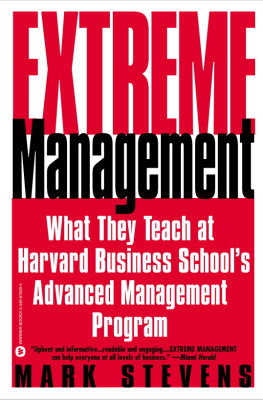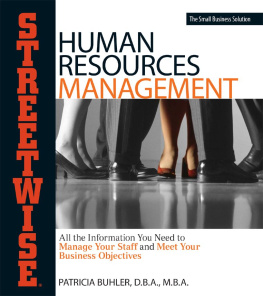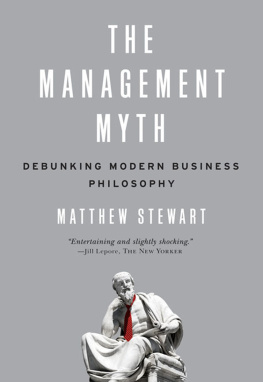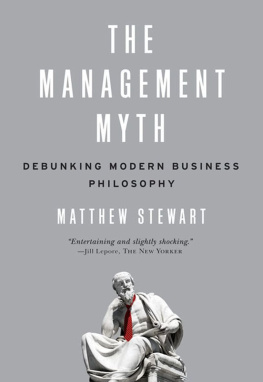Zed Books is an independent progressive publisher with a reputation for cutting-edge international publishing. Innovative and thought-provoking, the Economic Controversies series strips back the often impenetrable faade of economic jargon to present bold new ways of looking at pressing issues, while explaining the hidden mechanics behind them. Concise and accessible, the books bring a fresh, unorthodox approach to a variety of controversial subjects.
Series editor Edward Fullbrook is the founder and editor of the Real World Economics Review (formerly the Post-Autistic Economics Review), which has over 11,500 subscribers. He has edited a number of books on economics, including Pluralist Economics (2008) and A Guide to Whats Wrong with Economics (2004), and his essays on economics and philosophy have appeared in numerous anthologies and journals.
Already published in the Economic Controversies series:
Yanis Varoufakis, The Global Minotaur: America, the True Origins of the Financial Crisis and the Future of the World Economy
About the authors
Robert R. Locke is Emeritus Professor at the University of Hawaii at Manoa. He is one of the leading international authorities on the contentious subject of management, and the author of numerous books and articles on comparative management and management education.
J.-C. Spender is Visiting Professor at Lund Universitys School of Economics and Management and at ESADE (Universitat Ramon Llull). Now retired after seven years as a business school dean, he works as a consultant, researcher, writer, lecturer, and generally itinerant academic.
Confronting Managerialism
How the Business Elite and Their
Schools Threw Our Lives Out of
Balance
Robert R. Locke and J.-C. Spender

Zed Books
London & New York
Confronting Managerialism: How the Business Elite and
Their Schools Threw Our Lives Out of Balance was first published in 2011
by Zed Books Ltd, 7 Cynthia Street, London N1 9JF, UK and
Room 400, 175 Fifth Avenue, New York, NY 10010, USA
www.zedbooks.co.uk
Copyright Robert R. Locke and J.-C. Spender 2011
The rights of Robert R. Locke and J.-C. Spender to be identified as the
authors of this work have been asserted by them in accordance with the
Copyright, Designs and Patents Act, 1988
Typeset in Bulmer MT
by Bookcraft Ltd, Stroud, Gloucestershire
Index by Rohan Bolton,
Cover designed by www.alice-marwick.co.uk
Distributed in the USA exclusively by Palgrave Macmillan, a division of
St Martins Press, LLC, 175 Fifth Avenue, New York, NY 10010, USA
All rights reserved. No part of this publication may be reproduced, stored in a retrieval system or transmitted in any form or by any means, electronic, mechanical, photocopying or otherwise, without the prior permission of Zed Books Ltd.
A catalogue record for this book is available from the British Library
Library of Congress Cataloging in Publication Data available
ISBN 9781780320748
To the many victims of managerialism
The owl of Minerva takes flight at dusk.
G. F. W. Hegel
Tables
Figure
We would like to thank Edward Fullbrook, general editor of the Zed Books series Economic Controversies, for rousing us from our dogmatic slumbers with a request to write this short book on managerialism and business schools. We acknowledge, too, our debt to the following colleagues for their splendid help in the preparation of the text and the manuscript: Kenneth A. Locke, Chair of the Department of Religious Studies, University of the West, for material about Christianity; David A. Carter, Associate Professor of Finance, Oklahoma State University, Stillwater, for information on finance; and Vanessa Karam, of University of the West, and Idus A. Newby, of Cochran, Georgia, for their prompt and skillful editing of the manuscript. The final result, of course, is solely our responsibility.
RRL
JCS
As historians, we are keenly aware that our focus is on the thoughts and actions of the three generations who lived through the period covered in this study from the Great Depression of the 1930s to the present. But we also know that dumb facts do not speak for themselves, and that to give them a voice we need a narrative line. Ours can be identified from the components of our title, and it is simple. Today the people of the USA, indeed the world, live in difficult times, and to a significant extent American managerialism and US business schools have exacerbated these difficulties. Their ideas and actions shape the US and world economies and thus many lives.
Notice our title deals with managerialism, not management. Management is a big topic that cannot be properly treated here. Our focus is narrower, on managerialism. Although by the middle of the twentieth century the American idea of management had been more or less subsumed by managerialism, management and managerialism are not coextensive. While management can be defined as getting things done in organizations through people, managerialism means that in businesses, managers have come to view themselves as a professional caste. The distinction between managing and managerialism allows us to criticize managerialism without denigrating the critically important function of management.
Managerialism is defined as follows:
What occurs when a special group, called management, ensconces itself systemically in an organization and deprives owners and employees of their decision-making power (including the distribution of emoluments) and justifies that takeover on the grounds of the managing groups education and exclusive possession of the codified bodies of knowledge and know-how necessary to the efficient running of the organization. (Locke, 2009, 28)
The managerialist caste arose in the mid-twentieth century as the postWorld War Two economy boomed. Its public face was the reputation for commercial brilliance the boom implied. Yet the connection is far from obvious; many other causes can be cited. So, far from presuming the changes in management technique and attitude were beneficial, our book examines the damaging impacts this caste and its practices had in other ways, for instance, on peoples ability to make sense of their existence in a globalized society and economy as the twentieth century drew to a close. Without wishing to evoke a previous golden age, our narrative line moves from managing in a place where life was relatively in balance to one in which, in part because of the effect of managerialism, life spun progressively out of balance. The expression is taken from the Hopi word Koyaanisquatsi, which means crazy life, life in turmoil, life out of balance, life disintegrating, a state of life that calls for another way of living. Or, for those with religious inclinations, an existence without Gods grace; or, for humanists, one devoid of humanity in peoples daily lives.
With the history of managerialism as one theme, our books companion topic is business school education. Managers get their education in a variety of ways today, usually on the job. Increasingly, however, the selection and training of managers has become the focus of business-school-based education. Thus we critique the US elite business schools whose growth in the twentieth century has been associated with the rise of managerialism (Locke 1984, 1989, 1996, 2000, 2009; Spender 2005, 2007, 2008a, 2008b, 2008c). The elite schools influence over the lesser-ranked schools around the world is huge, especially when it comes to the content of their programs and the ethos their programs inculcate. The management education industry is now vast and global, but almost all of it marches to these elite schools drummers. Harvard Business School, which opened in 1908, has just celebrated its centennial while the Wharton School, arguably the first modern US business school, dates to 1881 (Engwall and Zamagni, 1998; Sass, 1982). Many other business schools Chicago, Dartmouth, Columbia, University of Texas, etc. trace their origins to the first quarter of the twentieth century. However, business school growth really exploded after World War Two with the proliferation of Master of Business Administration (MBA) programs driven, in part, by the GI Bills support for the broad expansion of higher education and in part by the needs of a dynamic economy. The schools growth has continued, even as the US economy has faltered from time to time. Business studies now preoccupy one of every five US college students. Eventually US business education, along with US systems of corporate governance and finance, became major export items.
Next page
